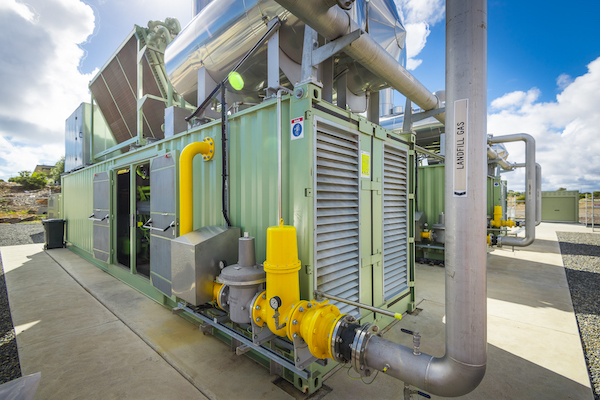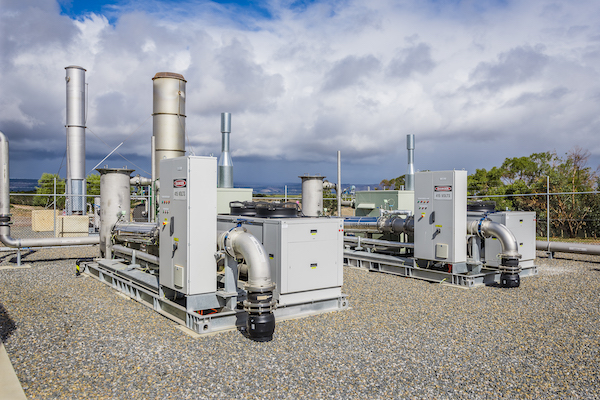LMS Energy (LMS) is Australia’s largest and most experienced landfill biogas company. In 2018 a change to the design of its generator sets required a new heat exchanger solution to dehumidify biogas, and the HRS K Series of industrial shell and tube heat exchangers proved ideal for the purpose.
Some 40 years ago, LMS pioneered the landfill biogas to energy industry in Australia, and now operates 60 biogas sites, generating more than 550,000 MW (1.87 billion BTU) of baseload power each year and abating over 4.4 million tons of CO2, making the company Australia’s largest emissions reducer.
The company captures potentially harmful methane gas which is generated in landfill as the contents decompose and burns it in generators to produce electricity. To enable the gas to be burned, the water content has to be reduced from fully saturated 100% relative humidity to around 80%. In the past LMS built its own generation modules which included on-board gas treatment, including dehumidification.

“In 2018 we switched to using containerized generator sets from Jenbacher, and these lacked the space for on-board gas conditioning,” explains Michael Lee, senior mechanical engineer at LMS. “The solution was to create a gas delivery skid containing an on-board blower, heat exchanger (to condense the water), and condensate removal vessel.” Having read an article by HRS and done some more research, LMS approached HRS Heat Exchangers to quote for the supply of identical biogas moisture removal (dehumidifier) units.
The engineering team at HRS realized that the K Series of stainless-steel shell and tube heat exchangers was ideal for the purpose, and that HRS’s corrugated tube technology would increase heat transfer and efficiency over standard smooth tube designs. During the lengthy design and approval process, HRS undertook a number of design revisions to achieve an optimum bespoke design that met the strict dimension and footprint limitations, while maintaining velocities and heat transfer coefficients which were actually higher than those specified.
The first two units were installed and commissioned and quickly proved their performance and reliability. Following the success of these units, HRS has supplied a further ten K Series heat exchangers to LMS, with the most recently currently being incorporated into a gas delivery skid for on-site installation later this year. “We have HRS heat exchanger dehumidifiers on eight of our sites,” continues Michael. “The biogas comes out of the landfill somewhere between 86 and 95 °F and after going through the heat exchanger the temperature is between 48 and 50 °F. This condenses out the water, which is then removed by the condensate removal vessel. A positive displacement blower then raises the temperature and pressure of the gas and sends it to the generator set.

“As well as making the biogas suitable for the generator set, reducing humidity also helps prolong engine maintenance and component life, extends oil change schedules and generally helps with operations.”
“Dehumidifying biogas doesn’t only increase the life expectancy of CHP engines and oil pumps, it also eliminates the formation of condensate in the gas pipeline resulting in potential increase in the CHP production runtime by eliminating the possible obstructing and blockage in the gas flow,” explains Ella Taghavi, technical sales engineer at HRS.
Michael is also complimentary about the relationship between LMS and HRS, which has included support and aftercare when required, including design verification for units already in operation, and providing assistance with obtaining work safe plant registration. “We’ve found HRS to be really easy to deal with and communication has always been very professional,” he says. “Their drawings have been very high quality and we have never had any issues with installing the heat exchangers into the gas delivery skids.”
